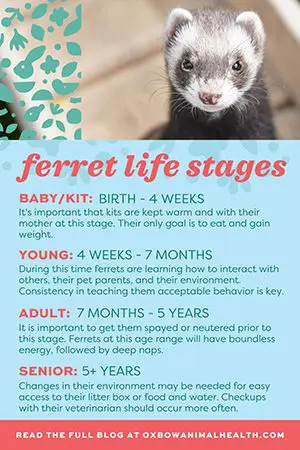Author: Pattie Larson, LVT
Updated: May 18, 2023
Ferrets make incredible companions and, like any of our pets, they have specific needs for every stage of their life. In this article, we’ll take a closer look at the life stages of your typical ferret friend!
What is the Lifespan of Ferrets?
Ferret lifespan will depend on a number of important factors, including genetics, nutrition, activity level, and care. The average lifespan of pet ferrets is 5-7 years. With a proper diet, healthy activity levels, and routine care, pet ferrets can live up to 10 years or more. The oldest ferret on record is 14 years.
Ferret Life Stages Include:
- Baby or Kit Stage: Birth – 4 weeks
- Youth (“Terrible Twos”): 4 – 7 weeks
- Youth (Adolescence): 7 – 12 weeks
- Young Adulthood: 4 – 7 months
- Mature Adult: 8 months – 5 years
- Senior: 6 years and up
The Baby or Kit Stage: (Birth to 4 weeks)
When ferret kits are born, they are completely helpless little jellybeans and fully dependent on their mothers as they are born completely blind and deaf. It is incredibly important that the kits are kept warm and with their mother at his stage. Their only goal will be to eat and gain weight. They get to know mom and their siblings through their scent. At this time, mom will need to bathe and clean them, they will not be able to go to the bathroom without stimulation. Towards the end of this period, you will start noticing their markings coming through and it will be easier to tell the girls from the boys.
Young Stages: The Terrible Twos (4 – 7 weeks)
At 4 to 5 weeks, the ferret kit’s eyes and ears will open. At this point, they will start to perceive things outside of their mom and siblings. Around this stage, they will no longer need to be stimulated to go to the bathroom and will even begin to leave the nest to potty. You will also witness the tiny furballs start to play with one another. This is the beginning of learning bite inhibition from their siblings. It is not uncommon for kits to nip at your fingers or bite quite hard and they will require correcting.
Ferret kits this age will want to chew on everything as their baby teeth begin to erupt, followed by their adult teeth coming in. Make sure to check on blankets and toys consistently and remove any damaged items that may cause problems. Weaning can begin during this time period by offering high-quality kibble soaked in water to make a mush or high-protein canned food. Mom will begin to encourage the kits to eat solid food but will continue to feed them herself as well.
Young Stages: Adolescence (7-12 weeks)
Adolescent ferret kits are extremely active and can really test your limits. However, it is a critical training period for your ferret buddies. It is important that they are handled gently and frequently. Get them used to being flipped upside down. Play with their ears and feet so they are used to being handled. This is also an excellent time to start teaching them to tolerate having their teeth brushed!
You will need to be consistent in teaching them acceptable behavior. Toward the end of this period and into the next, many kits end up in pet shops, so it is doubly important to get training started right away when you get them home since they may have a period of time without as much human interaction. Most kits will have their adult teeth by 10 weeks old. Their individual personalities will begin to show themselves.
Young Adulthood: (4-7 months)
Ferret kits this age will be all about play! At this point, they will be exploring actively and getting into everything! It is important to ferret-proof your home to keep them out of harm’s way. They will continue to learn to take cues from others and are getting an idea of their own strength. This is also the best time to introduce your new friend to other ferrets (if you have others in your home) but do so carefully. Poor interactions could result in lifelong fear. Start slow and in neutral territory, keeping them under careful observation. Providing plenty of fun toys, tunnels, and other types of enrichment is an excellent way to keep them distracted and playful.
Mature Adulthood: (8 months to 5 years)
Between 8-12 months, female ferrets will go into heat and be able to breed. It is important to get them spayed or neutered prior to this if they haven’t already had this done. At this point, their individual personalities are really shining through. As long as they have been properly trained early on, they will be lovely ferret ladies and gentlemen. They will still have boundless playful energy followed by deep naps.
Unlike younger ferrets, adults will be able to play and calm down more easily without getting overstimulated. Once ferrets are around 2 years old or older, they make the perfect playmates for younger ferrets by educating them on the proper way to act and keeping them in check. Ferrets at this stage should see their vet yearly for checkups unless they become ill.
Senior: (6 years and up)
Once your ferret is around 5 or 6 years old, he or she will begin to exhibit signs that they are entering the twilight years of life. Changes in their environment may be needed so that they can easily access their litterbox or food and water. Checkups with their veterinarian should occur more frequently to avoid any surprises sneaking up on them. They will slow down, sleep more, and need extra comfort and snuggling. Elderly ferrets may not have the same amount of patience with younger cage mates, and it is important to keep in mind that they may have sore joints. So, if you have extra exuberant playmates, you may want to offer your elder some quiet time on your lap.



